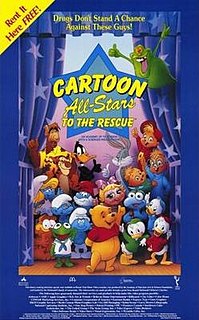
Wesley Cook Bentley is an American actor best known for his roles as Ricky Fitts in American Beauty (1999), which earned him a nomination for the BAFTA Award for Supporting Actor, Seneca Crane in The Hunger Games (2012), Doyle in Interstellar (2014) and Erik in Mission: Impossible – Fallout. He was one of four subjects in the documentary My Big Break (2009), which covered his fame after American Beauty and struggles with substance abuse. Rebuilding his career, he starred in the premiere of Venus in Fur by David Ives in the off-Broadway production in 2010. His other film roles include The Four Feathers (2002), Ghost Rider (2007), P2 (2007), and Pete's Dragon (2016).

"Just Say No" was an advertising campaign prevalent during the 1980s and early 1990s as a part of the U.S. "War on Drugs", aiming to discourage children from engaging in illegal recreational drug use by offering various ways of saying no. The slogan was created and championed by First Lady Nancy Reagan during her husband's presidency.

Cartoon All-Stars to the Rescue is a 1990 American animated drug-abuse prevention television special starring many characters from American animated television series at the time of its release. Financed by McDonald's, Ronald McDonald Children's Charities, it was originally simulcast for a limited time on April 21, 1990 on all four major American television networks : ABC, CBS, NBC, and FOX, and most independent stations, as well as various cable networks. McDonald's also released a VHS home video edition of the special distributed by Buena Vista Home Video, which opened with an introduction from President George H. W. Bush, First Lady Barbara Bush and their dog, Millie. It was produced by the Academy of Television Arts & Sciences Foundation and Southern Star Productions, and was animated overseas by Wang Film Productions Co., Ltd.. The musical number "Wonderful Ways to Say No" was written by Academy-Award-winning composer, Alan Menken and lyricist Howard Ashman, who also wrote the songs for Disney's The Little Mermaid, Beauty and the Beast, Aladdin, and Hercules.

The National Institute on Drug Abuse (NIDA) is a United States federal-government research institute whose mission is to "advance science on the causes and consequences of drug use and addiction and to apply that knowledge to improve individual and public health."

Problem gambling is an urge to gamble continuously despite negative consequences or a desire to stop. Problem gambling is often defined by whether harm is experienced by the gambler or others, rather than by the gambler's behaviour. Severe problem gambling may be diagnosed as clinical pathological gambling if the gambler meets certain criteria. Pathological gambling is a common disorder that is associated with both social and family costs.

Intervention is an American series that premiered on March 6, 2005, on A&E. It follows one or two participants, who are dependent on or addicted to drugs. They are documented in anticipation of an intervention meeting by family or friends. During the intervention meeting, loved ones give the addict an ultimatum: go to an inpatient drug rehabilitation program immediately, or else risk losing contact, income, or other privileges. The show follows up on the recovery progress for future episodes or for web shorts.
Drug courts are judicially supervised court dockets that provide a sentencing alternative of treatment combined with supervision for people living with serious substance use. Drug courts are problem-solving courts that take a public health approach using a specialized model in which the judiciary, prosecution, defense bar, probation, law enforcement, mental health, social service, and treatment communities work together to help addicted offenders into long-term recovery.
Drug education is the planned provision of information, resources, and skills relevant to living in a world where psychoactive substances are widely available and commonly used for a variety of both medical and non-medical purposes, some of which may lead to harms such as overdose, injury, infectious disease, or addiction.
Peer support occurs when people provide knowledge, experience, emotional, social or practical help to each other. It commonly refers to an initiative consisting of trained supporters, and can take a number of forms such as peer mentoring, reflective listening, or counseling. Peer support is also used to refer to initiatives where colleagues, members of self-help organizations and others meet, in person or online, as equals to give each other connection and support on a reciprocal basis.
Marc Galanter is Professor of Psychiatry at New York University School of Medicine and has served as the Founding Director of the Division of Alcoholism and Drug Abuse. His studies have addressed family therapy for substance abuse, pharmacologic treatment for addiction, and Twelve Step recovery for addiction. He is an author of over 200 peer-reviewed articles.

KELY Support Group is a non-governmental bilingual organisation in Hong Kong which aims to provide support to youth between the ages of 14 to 24. Its programmes and services focus on prevention and intervention of alcoholism and other drug abuse, and are designed to tackle what the group regards as the common reasons for abuse such as boredom, peer pressure, lack of self-awareness, low self-esteem, poverty, unemployment and discrimination.

Poplar River First Nation is an Ojibwa First Nation in Manitoba, Canada. It is named after the Poplar River, which is the main river on which it resides.

Substance abuse prevention, also known as drug abuse prevention, is a process that attempts to prevent the onset of substance use or limit the development of problems associated with using psychoactive substances. Prevention efforts may focus on the individual or their surroundings. A concept that is known as "environmental prevention" focuses on changing community conditions or policies so that the availability of substances is reduced as well as the demand. Individual Substance Abuse Prevention, also known as drug abuse prevention involves numerous amounts of different sessions depending on the individual to help cease or reduce the use of substances. The time period to help a specific individual can vary based upon many aspects of an individual. The type of Prevention efforts should be based upon the individual's necessities which can also vary.

LifeRing Secular Recovery is a secular, non-profit organization providing peer-run addiction recovery groups. The organization provides support and assistance to people seeking to recover from alcohol and drug addiction, and also assists partners, family members and friends of addicts or alcoholics. It is an abstinence-based recovery program with three fundamental principles: sobriety, secularity and self-empowerment. The motto of LifeRing is "empower your sober self."
St. Joseph Catholic High School is a secondary school located in North-Central Edmonton. In a guided customized learning program, students develop the essential skills required to build effective working relationships with their peers and faculty. The faculties objective is to help all students gain the essential skills required to be a self-directed learner upon graduating from this high school. St. Joseph is a member of the Canadian Coalition of Self-Directed Learners and is the only self-directed learning school in Canada to offer International Baccalaureate. The Jean Forest All Girls Leadership Academy' is also located within the high school.

The Alberta Adolescent Recovery Centre, or AARC, is a drug rehabilitation centre for adolescents and family members located in Calgary, Alberta. AARC specializes in treating young people suffering from drug addiction and alcoholism, and takes in clients who have been thought of as being too far-gone for recovery. The AARC program is a multifaceted drug treatment program that uses twelve-step recovery processes, peer pressure, family and group therapy. A survey conducted by AARC found they had an 80% success rate, and that former addicts can permanently abstain from using drugs or alcohol following treatment at the centre. Another study found that the "AARC program is a unique model for comprehensive, long-term adolescent substance use treatment with a high rate of treatment completion (80.5%)."
PARfessionals is an Arkansas-based, private research development firm for Peer Support and Recovery Providers in Addictions.
Discrimination against drug addicts is a form of discrimination against people who suffer from a drug addiction. In the process of stigmatization, drug addicts are stereotyped as having a particular set of undesirable traits, in turn causing other individuals to act in a fearful or prejudicial manner toward them. Drug use discrimination also leads to many users being secretive about drug use. As it relates to healthcare stigmatizing attitudes surrounding drug use can cause barriers to treatment uptake and engagement. In some of its manifestations, discrimination against drug addicts involves a violation of human rights.

The opioid epidemic, also referred to as the opioid crisis, is the phrase used to describe the overuse, misuse/abuse, and overdose deaths attributed either in part or in whole to the class of drugs opiates/opioids, and the significant medical, social, psychological, and economic consequences of both the medical and the non-medical or recreational use of these medications.











